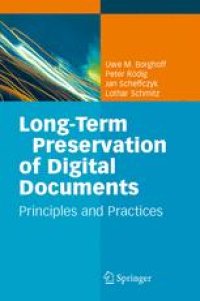
Ebook: Long-Term Preservation of Digital Documents: Principles and Practices
- Tags: Information Storage and Retrieval, Library Science, Document Preparation and Text Processing, Cultural Heritage
- Year: 2006
- Publisher: Springer-Verlag Berlin Heidelberg
- Edition: 1
- Language: English
- pdf
Key to our culture is that we can disseminate information, and then maintain and access it over time. While we are rapidly advancing from vulnerable physical solutions to superior, digital media, preserving and using data over the long term involves complicated research challenges and organization efforts.
Uwe Borghoff and his coauthors address the problem of storing, reading, and using digital data for periods longer than 50 years. They briefly describe several markup and document description languages like TIFF, PDF, HTML, and XML, explain the most important techniques such as migration and emulation, and present the OAIS (Open Archival Information System) Reference Model. To complement this background information on the technology issues the authors present the most relevant international preservation projects, such as the Dublin Core Metadata Initiative, and experiences from sample projects run by the Cornell University Library and the National Library of the Netherlands. A rated survey list of available systems and tools completes the book.
With this broad overview, the authors address librarians who preserve our digital heritage, computer scientists who develop technologies that access data, and information managers engaged with the social and methodological requirements of long-term information access.
Fundamental to human culture is our ability to disseminate information, and then maintain and access it over time. While technology is rapidly advancing from vulnerable physical solutions to superior, digital media, the challenge of preserving and using data over the long term will challenge our research and organization efforts.
In this book, Uwe Borghoff and his coauthors address the problems of storing, reading, and using digital data for periods longer than 50 years. They offer concise descriptions of markup and document description languages like TIFF, PDF, HTML, and XML, explain important techniques such as migration and emulation, and present the OAIS (Open Archival Information System) Reference Model.
The authors explore the most relevant international preservation projects, such as the Dublin Core Metadata Initiative, and experiences from sample projects run by the Cornell University Library and the National Library of the Netherlands.
A rated survey list of available systems and tools completes the book.
Fundamental to human culture is our ability to disseminate information, and then maintain and access it over time. While technology is rapidly advancing from vulnerable physical solutions to superior, digital media, the challenge of preserving and using data over the long term will challenge our research and organization efforts.
In this book, Uwe Borghoff and his coauthors address the problems of storing, reading, and using digital data for periods longer than 50 years. They offer concise descriptions of markup and document description languages like TIFF, PDF, HTML, and XML, explain important techniques such as migration and emulation, and present the OAIS (Open Archival Information System) Reference Model.
The authors explore the most relevant international preservation projects, such as the Dublin Core Metadata Initiative, and experiences from sample projects run by the Cornell University Library and the National Library of the Netherlands.
A rated survey list of available systems and tools completes the book.
Content:
Front Matter....Pages I-XV
Front Matter....Pages 1-1
Long-Term Preservation of Digital Documents....Pages 3-20
OAIS and DSEP Organizational Models....Pages 21-30
Migration....Pages 31-56
Emulation....Pages 57-78
Document Markup....Pages 79-98
Standard Markup Languages....Pages 99-122
Discussion....Pages 123-132
Front Matter....Pages 134-134
Markup: Current Research and Development....Pages 135-169
Migration: Current Research and Development....Pages 171-206
Emulation: Current Research and Development....Pages 207-219
Software Systems for Archiving....Pages 221-255
Back Matter....Pages 257-274
Fundamental to human culture is our ability to disseminate information, and then maintain and access it over time. While technology is rapidly advancing from vulnerable physical solutions to superior, digital media, the challenge of preserving and using data over the long term will challenge our research and organization efforts.
In this book, Uwe Borghoff and his coauthors address the problems of storing, reading, and using digital data for periods longer than 50 years. They offer concise descriptions of markup and document description languages like TIFF, PDF, HTML, and XML, explain important techniques such as migration and emulation, and present the OAIS (Open Archival Information System) Reference Model.
The authors explore the most relevant international preservation projects, such as the Dublin Core Metadata Initiative, and experiences from sample projects run by the Cornell University Library and the National Library of the Netherlands.
A rated survey list of available systems and tools completes the book.
Content:
Front Matter....Pages I-XV
Front Matter....Pages 1-1
Long-Term Preservation of Digital Documents....Pages 3-20
OAIS and DSEP Organizational Models....Pages 21-30
Migration....Pages 31-56
Emulation....Pages 57-78
Document Markup....Pages 79-98
Standard Markup Languages....Pages 99-122
Discussion....Pages 123-132
Front Matter....Pages 134-134
Markup: Current Research and Development....Pages 135-169
Migration: Current Research and Development....Pages 171-206
Emulation: Current Research and Development....Pages 207-219
Software Systems for Archiving....Pages 221-255
Back Matter....Pages 257-274
....